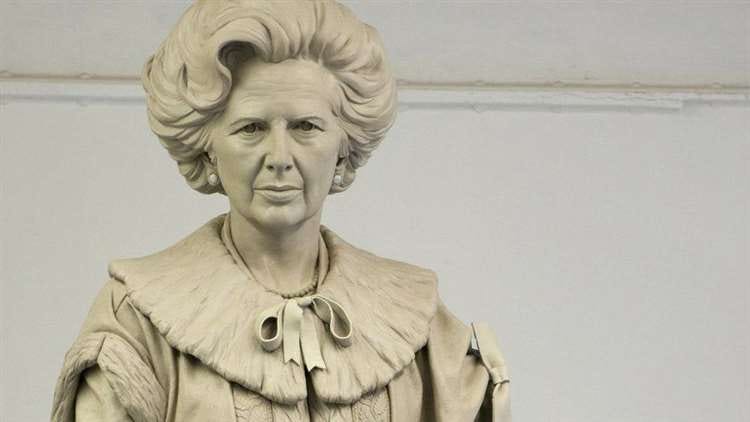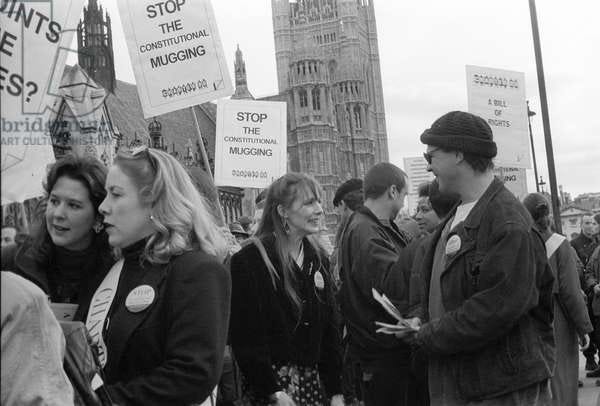Britain’s curdling democracy
Labour Leader John Smith makes history as the first leader of a major party to challenge the British constitution.
On a school trip to Germany once, I absent-mindedly forgot to seal the Ziploc around my cheese sandwiches before dropping them into my drawstring bag. This might not have been a problem, but like many teenagers away from the watchful gaze of their parents, I bought a McDonalds at the first service station we stopped at and the sandwiches spent the entirety of the transnational bus ride being kicked progressively further under the seat in front.
By the time we arrived in Berlin, the inside of the bag looked like it had been fragged by a cheese grenade, its contents a pulpy mess of cheddar and tamped Mother’s Pride. At the heart of the destruction, gift-wrapped in a layer of sweaty, crumbled cheese, was my mp3 player.
Before the days of sleek iPods and glossy touch screens, the cheese had forced its way into the device through every orifice it could find. It still worked, but the headphones now needed to be carefully positioned and frequently rejigged to pick up sound, the buttons stuck, and the flicker on the side of the device was temperamental, so that I often had no control over what was being played.
The Westminster political machine and British democracy was working, but had long been clogged with metaphorical cheese by the early 1990s. The Thatcher government of the 1980s had crippled local governments, leaving communities unable to deliver basic provisions. The centralisation of power saw laws heralded from London with little consideration for regional differences in needs and wishes, and the gutting of trade union and welfare rights had trampled long held liberties.
Even before the Conservatives came to power, the First Past the Post Electoral system that has dominated British politics since 1948 had produced unrepresentative and undemocratic Commons majorities. An unelected House of Lords—containing more than 600 earls, dukes, baronets, and viscounts that had inherited their peerage—crafted legislation. Like a high school student stuck listening to Teenage Dirtbag on repeat on a curdling Nextar 2GB mp3 player (black, not red), the British public had seemingly lost control of the policymaking process, reducing them to subjects under an all-powerful state rather than active participants in democracy.
Thatcher and the birth of Charter 88
“The constitution is the central issue of British politics today, because Mrs Thatcher has herself made it so.”—David Beetham, an original Charter 88 signatory.
The Thatcher administration roused fresh appetite for an overhaul of the British political system and was in large part responsible for birthing Charter 88, a pressure group that led the organised movement for constitutional reform. The abolishment of the Greater London Council and other metropolitan authorities stripped localities of their autonomy, efforts to silence journalists, whistle-blowers, and Irish Republicans undermined free speech, and the scaling back of the welfare state challenged the social contract.
The 1987 election was the final straw. The Conservatives won 376 seats with just 42.2% of the popular vote—a seat total they have never surpassed, despite taking a higher share of the popular vote in 2017 and 2019. With the backing of fewer than half of British voters, they had secured a majority that severely curtailed Parliament’s ability to hold the executive to account.
After the election, 348 British intellectuals and activists joined an appeal organised by the editor of the New Statesman Stuart Weir expressing dissent. Following the model of Czechoslovakia’s informal campaign for civic initiative, Charter 77, the signatories produced a ten-point manifesto, then recruited sympathisers to sign on to the appeal. Follow-up adverts in the Guardian and the Independent led to a two-page advert in the Observer with 5,000 signatories. By 1989, the group had office space and had become an organisation under the banner Charter 88.
Charter 88 advocated a more pluralist political system with more restrictions on power than the existing Westminster democratic model. Among their demands were a universal bill of rights that protected freedom from discrimination and freedom of expression; increased government transparency and a freedom of information act; an electoral system based on proportional representation; a democratic, non-hereditary House of Lords; devolution to local and regional governments; and a codified constitution.
Charter 88 and the Labour Party
Charter 88 sought to build a coalition that transcended traditional party politics. It was a response to Thatcherism from the left, but it would need a wide and resilient support base to enact a lasting constitution immune from electoral politics and shifting political winds. As such, it courted public support through advertisements in national media outlets and through intellectual and literary celebrity endorsements.
Neil Kinnock, while somewhat receptive to electoral reform, was unreceptive to the group’s methods and demands, dismissing the movement’s leaders as “whingers, whiners, and wankers” (although he later signed the Charter after stepping down as leader). His deputy Roy Hattersley was openly hostile. Smith’s ascent to Labour leader, however, offered a new opportunity for Charter 88. Constitutional reform in the form of devolution and the introduction of a ‘Bill of Rights’ had been one of John Smith’s few policy commitments in the 1992 Labour Leadership election.
There were compelling reasons for the Labour Party to engage with constitutional reform in early 1993. In its first five years, Charter 88 had accrued nearly 50,000 signatures and had brought the issue of constitutional reform in from the margins of political debate.
A more politically demanding and enquiring public was becoming more resentful of the Conservatives’ London-centric approach to government. Turnout at the 1992 general election had been the highest in 18 years. The new intake of Labour MPs in 1992 also backed election reform by a margin of 65 percent in favour to 25 percent against.1
The project of European integration was putting the issues of sovereignty, participatory decision-making, and human rights in the public view and highlighting divergences between the UK and its European peers. The UK was, for example, the only European nation without a codified bill of human rights enshrined in law. Catalonia and Bavaria enjoyed devolved powers while Scotland, Wales, and Northern Ireland did not.
“It was a deliberate political strategy to indicate directions of travel but not specific policy details early in the Parliament, with one big exception which was constitutional reform,” David Ward, John Smith’s head of policy, told IFTC. Constitutional reform had no price tag, which was important so far out from an election. Nobody wanted a repeat of the 1989 Policy Review that had given the Tories plenty of time to drum up concerns over the associated costs.
“Smith was very enthusiastic about it. It was also an area where the Tories wouldn’t compete, so it was a good idea to start the policy process with quite detailed proposals.”
There were ruminations within the Conservative Party from MPs like William Waldegrave and John Patten, but for them, increased transparency meant publishing school and hospital league tables, not a whole-of-government approach.
Where better to start the policy process?
To kick off the policy process, Smith delivered a speech to Charter 88 in Church House in Westminster. He lambasted the central power grab undertaken by the Thatcher government and made the case for devolution as a better representation of regional divergence and for closer alignment with European models of government. Smith also called for the adoption of the European Convention of Human Rights and the establishment of an independent Human Rights Commission, and pushed for legal reform, a reversal of cuts to the legal aid system, a Freedom of Information Act, and independent auditing of government economic forecasts. If Smith’s speech at the Local Government Conference the previous month had been policy-lite, this speech was a policy extravaganza.

Writing in the Independent, Andrew Marr emphasised the speech’s historical significance. “It was the first time in the post-war era that a leader of one of the big parties had devoted a speech to attacking the state of the British constitution.”
Drawing attention to the cheese plugging British democracy put the Conservatives in an uncomfortable position. They could label the speech a product of Labour’s desperation—it was in part, successive election defeats had fostered disillusionment with the British political system—but to fight Labour on its substance would have forced the Conservatives to defend the existing Westminster-knows-best, black box governing style that kept the British public locked out of policymaking.
Behind the scenes, Labour’s media strategy was adapting to fit its new leader’s strengths
The speech was also significant for another reason. It resulted in a loosening of media controls by the Leader of the Opposition’s office. David Ward remembers how Smith’s performance in the Q & A session following the speech had been even more persuasive than the prepared remarks.
“I thought it went really well. I got home just in time to see Jeremy Paxman opening up on Newsnight and his opening crack was 'John Smith’s just committed to freedom of information, but we’re not able to show you the discussion afterwards because the Labour Party says it is off the record.'”
“I went into the office the next day and asked 'what happened there? Who said John’s Q & A was off the record?’ The reply was: ‘it’s our standard operating procedure that we have been doing for years.’ I said, 'please stop that, that is not the way John would have wanted it.'”
“They had got themselves so cautious about Neil [Kinnock] that they were strictly embargoing anything that wasn’t pre-prepared from being aired. It was a real eye-opener for me… It was inheriting a media control regime from the past that wasn’t appropriate for John’s personality."
Calling out the problem was the first step
Anthony Barnett, Charter 88’s founding director, wrote in 2011 that “the most powerful ideologies are those that exercise their hegemony by denying their existence and thus cannot be challenged.” By pointing out the cheese in the Westminster machine and starting the policy discussion early, John Smith opened the door for future challenges by making constitutional reform part of the Labour tradition.
In a survey of 52 of the 69 new MPs.




